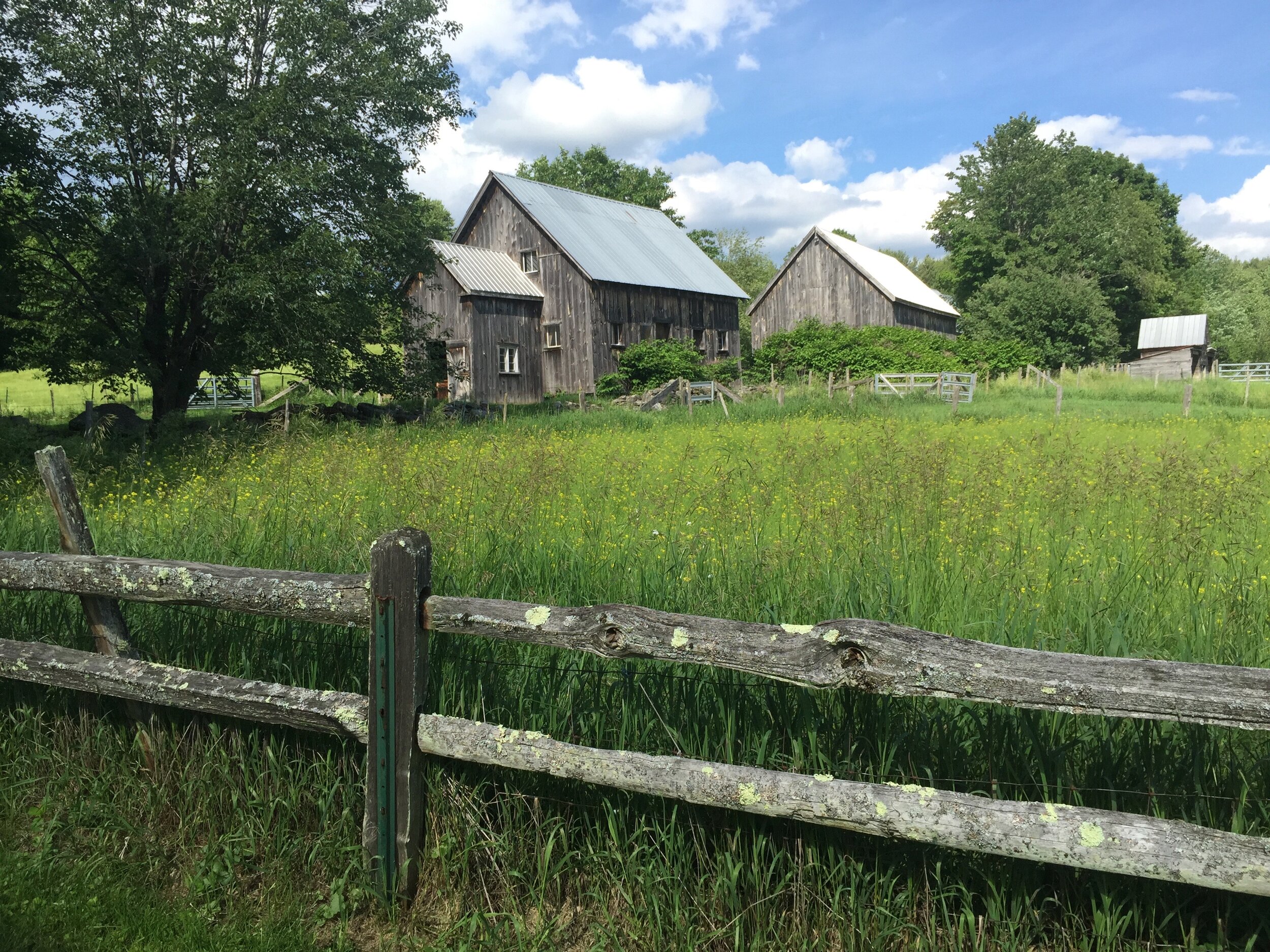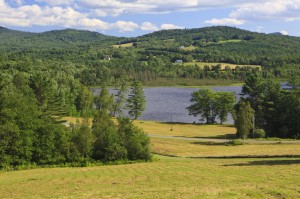
Explore
LISBON CONSERVATION AREAS
Tranquil Vewe Croft
19th-century barns grace Tranquil Vewe Croft.
Dori Hamilton has protected a slice of North Country heritage, a place for future farmers, and land that helps protect the quality of the Ammonoosuc River by putting a conservation easement on her Sweeney Road farm.
“I did this to be sure that my farm is forever in kept in its natural state, as an area to be farmed, a refuge for wildlife, and its beauty to be observed, “ Dori says.
Dori grew up in rural Pennsylvania. When she was very young, her father managed a dairy farm. After a career as a Navy nurse and retiring in the late 1980s, she sought a place where she could raise livestock on a farm of her own. She found the perfect place on Sweeney Road in Lisbon, a farm first settled in the 1800s where sheep, cows, chickens and pigs had been raised, with gorgeous barns, ample pastures, and an apple orchard.
Dori named her property Tranquil Vewe Croft in memory of her mother, who was raised on Tranquil Farm in Pennsylvania, and her Scottish father – “croft” being the term for a small farm in Scotland. “Vewe” is a play on sheep words. Hamilton’s father lived with her at the farm for a time before his death.
Dori’s largest herd was 50 Romney and Oxford sheep after an original flock of 10. She and farm neighbors cooperatively hayed and baled six fields along nearby Walker Hill and Slate Ledge roads. Bales were stored in one of Dori’s barns.
Dori is a fixture at the Littleton Farmers Market, spinning and selling wool. Year round she sells her wool at the ARTS Gallery in Lisbon, where she also volunteers.
In addition to being a picturesque farm, Dori’s land includes wildlife habitat in it woods and is part of the undeveloped land on the west side of Route 302 that provides a buffer toward the Ammonoosuc River. Her property is part of the land the NH Dept. of Environmental Services has identified as important for drinking water protection.
“Having seen other properties in our area stripped of their natural beauty, I wanted to make sure that never happened to mine,” Dori says.
On behalf of the entire community, thank you, Dori!
Red Oak Farm
A fabulous property with a stately forest, important wildlife habitat, and some unusual plant species is now conserved forever thanks to the generosity of landowners Eileen Mahoney and Jim Pasman.
The nearly 130-acre property is located near Perch Pond in Lisbon. It is part of an area that used to be the Bishop Farm. Local developer Jim Powers bought a large part of that land in the 1990s and subdivided it. Jim and Eileen bought their property in 1999, naming it Red Oak Farm in honor of a giant oak that captured their hearts.
The place is where they get away from the city, enjoy the natural beauty, and manage the land for wildlife and timber. They enjoy hiking, cross-country skiing, and other outdoor recreation. Jim and Eileen decided to put a conservation easement on the property to ensure that these uses continue into the future, and that the land remains open and undeveloped. They approached ACT in 2015 about donating an easement on the property.
“One effective way we could sustain that rural, open, and ecologically-valuable space we have is through conservation,” says Jim. “As a family, we felt it was important to ensure our property remained undeveloped, especially for wildlife habitat. For that reason, we chose to donate a conservation easement.”
Landowner Jim Pasman wraps his arms around the red oak tree that is his farm's namesake.
“Working with the entire ACT team, from Rebecca’s initial visit explaining conservation options, to the Lands Committee’s tour, and then the board confirmation, was a learning process,” Jim continued. “Most important, it confirmed that our values and goals for the property were truly aligned with those of the Trust. We feel as though we are now part of the ACT community or ‘family’ working to conserve and protect the North Country environment.”
Thanks, Jim and Eileen, for the honor of working with you to realize your vison for your land and your commitment to the environment of the North Country now and forever!
Click here to learn more about how ACT protects land, including conservation easements and other conservation options for landowners.
Pearl Lake Shorefront
Looking over the 3 acres of prime Pearl Lake shorefront, now forever protected.
(Jerry & Marcy Monkman/EcoPhotography.com)
Three acres along the shore of Pearl Lake in Lisbon, NH are now protected; thanks to the vision of former owner Betty Matthews and the generosity of the current owners.
Rosalind Page and Tom Simpson, who bought Matthew’s property, agreed to donate a conservation easement on the land. Matthews had initiated the project before she sold her house and land and moved to Berkeley, CA, where she is much closer to children and grandchildren.
The shorefront property abuts land owned by the Town of Lisbon and the Aldrich Memorial Pasture, a conserved natural area. It is within the town’s Pearl Lake Conservation District. The town’s master plan states that land within that district “should be protected by purchase or the obtaining of conservation easements.”
The parcel affords an unfettered view across the lake to the picturesque wooded hills and fields of Landaff. A snowmobile route maintained by the Lisbon Stump Jumpers also crosses the property.
This easement was the first recorded by ACT in the town of Lisbon. Thanks to Rosalind Page, Tom Simpson, Betty Matthews, and the town administrators who helped in completing the easement in 2005.
As a sign of her commitment to her new home and to the importance of land conservation, Rosalind joined the ACT Board of Trustees in 2010 and served as its chair from 2012 until her retirement from the board in September 2018.
Ammonoosuc River Wildlife Management Area
The opportunity for re-establishing a floodplain, managing riverbank erosion, and excellent wildlife habitat – all are reasons ACT purchased 21 acres on the Ammonoosuc River in Lisbon. The land had been two separate ownerships. One is a parcel around Hanno Pond on Route 302 that was for sale. Despite much of the land being wetlands, Lisbon zoning would have allowed commercial development there. The other is a nine-acre field along the river that was owned by a local farmer. Riverbank erosion was making it impossible for him to get his tractor there. ACT was awarded grant money to make the purchases from a state fund developers pay into when they disturb wetlands.
ACT has an interest in this stretch of river from Salmon Hole Brook, where Route 302 crosses the river, down to Lisbon village and the soccer field just next to New England Wire field that is steadily eroding into the river. It is a very dynamic section of river: huge ice jams often form there in the late winter and early spring, scouring the banks and taking away riverbank. But it’s also a good stretch for trout, and an excellent birding place. Our goal is re-establishing the forest that would have grown along the banks before being cleared for agriculture, and possibly doing more aggressive bio-engineering of the riverbank for stabilization. Students from Lisbon School helped plant tree seedlings there, and there will be additional planting there next year.




